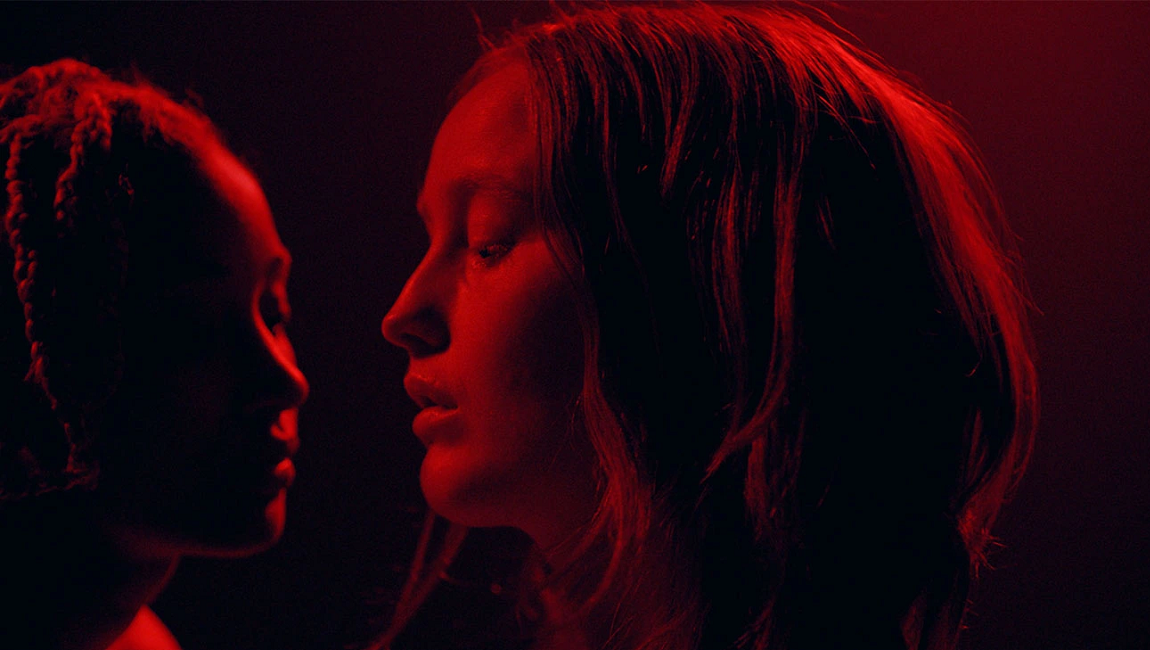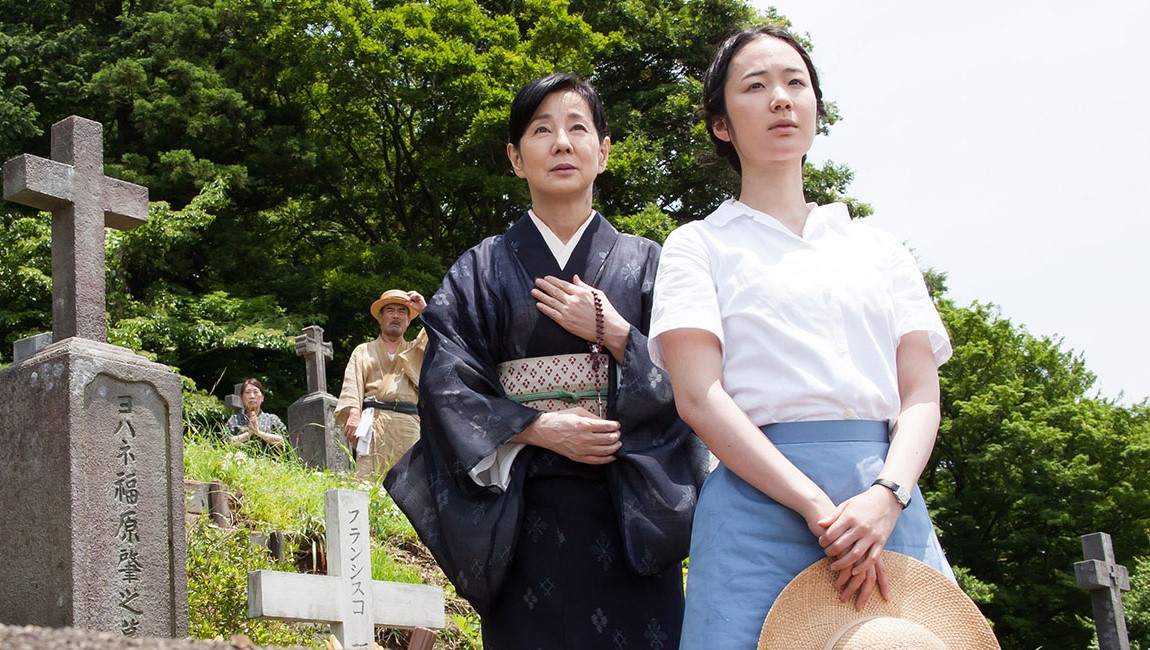An indie horror film about a young woman trying to keep her inner beast at bay, it’s a testament to Jacqueline Castel’s My Animal that there are long stretches where it’s easy to overlook that the film’s actually about a werewolf and longer stretches still where one wishes it ditched the premise altogether. Set in a small, snowy Canadian town in the ’80s, My Animal initially treats lycanthropy as a shameful, albeit manageable, health condition that afflicts multiple members of a closely knit yet visibly dysfunctional family, requiring young adult, Heather (model-turned-actor Bobbi Salvör Menuez), and her father, Henry (the great Canadian character actor, Stephen McHattie), to restrain themselves at night to their beds with chains and manacles during full moons. Only a year or two out of high school, Heather’s burgeoning independence and desire to spend the night out with new friends runs headlong into a hard midnight deadline, where missing curfew means a great deal more than a stern lecture from her parents. Namely, that she runs wild through the neighboring woods in wolf-form, a threat to both herself and anyone she might come into contact with.
Of course, full moons only occur at most twice per month — lunar cycles make for a nifty metaphor in a story about a young woman’s sexual awakening, one of several the film employs — and, for most of the film, Heather is primarily concerned with a different, “shameful” secret that threatens to destroy her if exposed. A tomboy who doesn’t wear makeup, has hairy pits, keeps posters of female bodybuilders up around her workout space, and dreams of trying out for the town’s all-male amateur hockey team, Heather is almost overly coded as butch, or would be if anyone in the community had the slightest clue what that actually meant. When she spots the new girl in town, a competitive ice dancer with peroxided braids who goes by Jonny (Bodies Bodies Bodies’ Amandla Stenberg), there’s an instant sense of longing, though it’s unclear how reciprocated that feeling is. In keeping with the long tradition of ’80s genre films, Jonny has a jerk boyfriend, Rick (Cory Lipman), and is even oblivious to her own father (Kids in the Hall great, Scott Thompson) being in the closet. But she’s kind to Heather and invites her out to do stupid teenager things like getting drunk, sneaking into a nearby casino, and doing donuts in the snow. Not that it’s clear Heather would even know what to do if Jonny did show interest in her; her sexual experience seems to be limited to secretly masturbating to women’s professional wrestling on television (Heather making a clumsy double entendre about eggs leads to a particularly gooey sex dream).
There’s a swirling, smeary headiness to the scenes between Heather and Jonny, so much so that the characters dropping acid while strolling between the neon glow of slot machines almost feels like gilding the lily. Castel’s direction leans heavily on fire and ice imagery, with Menuez often framed by blown-out reds — as though the aesthetic were taking inspiration from the actor’s strawberry-colored hair — which bleeds into cool blue gels during the film’s impressionistic love scenes. Jonny represents the glimmer of a life outside of Heather’s depressing existence of mopping up at the local ice rink (where their shared athletic pursuits allow them to see one another during the daytime as well) and caring for her alcoholic mother (Heidi von Palleske). Everything about Jonny feels exciting and different, from her conspicuous sense of style — My Animal is the sort of film where everyone wears bulky winter coats and scratchy-looking scarves — and outward sexual confidence to having moved from the big city; this all on top of the obvious, albeit uncommented upon, reality that she appears to be the only person of color in the entire town. Their infatuation with one another is closely held out of necessity, but also free to exist with minimal scrutiny no matter how much they might hang off of one another at the local bar or snuggle together while driving a zamboni around a hockey rink. After all, who would suspect two women of being lovers? That just doesn’t happen in a place like this.
Castel’s film isn’t particularly subtle in conflating Heather’s lesbianism with being a werewolf, but, for much of its runtime, the connection is incidental. Gorehounds in particular are likely to be frustrated with the film, as Heather’s transformations into a wild animal are fleetingly depicted and mostly confined to the film’s bookends, both almost certainly out of budget necessity, with Castel favoring distorted angles and Evil Dead-esque shaky cam over Rick Baker-inspired grotesquerie. Instead, being a werewolf becomes a big honking metaphor for acceptance and burying your true self down deep out of fear of rejection and even more immediate danger; after Heather is outed as gay, the disposition of the town changes toward her over night, and the threat of violence becomes a very real possibility. Even in her human form, Heather self-consciously tugs on her long arm hair, and it’s unclear how much her own family, who tend to her involuntary cuts and scratches and know what a heavy burden maintaining a secret life is, would support her life choices. McHattie’s soulful performance provides the film’s conscience, reassuring Heather “someone’s going to come along and accept you for who you are” and comforting her with “we can make anything work,” although the film is purposefully unclear how much dad is aware of her sexuality as opposed to talking about the fantastical family secret. After all, Henry may clear out the TV room so the two girls can spend some time alone together in the basement, but after Heather misses curfew, the first thing he assumes is that she was out with a boy.
My Animal positions Jonny as the “someone” who will come along and love Heather “fur and all,” but the film subverts expectations with the character becoming afflicted by post-consummation gay panic, cruelly spurning Heather and only further isolating her. With a long-promised “blood moon” only days away, it’s merely a question of who the victims of Heather’s “animal inside” will ultimately be — the film hints at a Near Dark-level massacre at the local tavern, but settles for something far less memorable. But for as effectively as the film captures the swoony blush of first love and finally meeting someone worth opening yourself up to, it peters out in the homestretch; introducing new wrinkles it scarcely has the time or inclination to address, and losing track of prominent characters while denying Heather any true sense of closure across a number of fronts. My Animal is at its best when it simply allows Menuez and Stenberg to hold its center: hungrily staring into one another’s eyes and pawing at each other against shocks of primary colors that cut through the desolate, gray winterscape, all set to retro-sounding electropop. The film’s 1980s production design — a VHS of Cujo is cutely sneaked into the frame at one point — establishes a credibly oppressive time and place to be young and queer without beating the viewer over the head. But it’s also a film primarily built on vibes and texture, which eventually pushes the overarching allegory so far to the margins it begins to feel extraneous. Like the character of Heather, My Animal eventually comes to treat all the werewolf business as a burdensome obligation that has outlived its usefulness.
DIRECTOR: Jacqueline Castel; CAST: Bobbi Salvör Menuez, Amandla Stenberg, Stephen McHattie; DISTRIBUTOR: Paramount; IN THEATERS/STREAMING: September 8/September 15; RUNTIME: 1 hr. 43 min.







